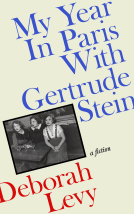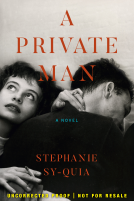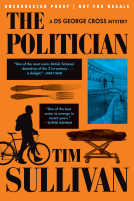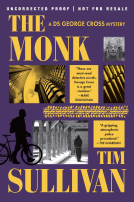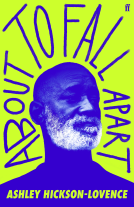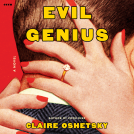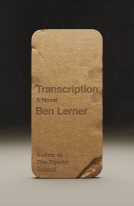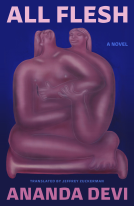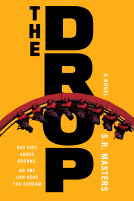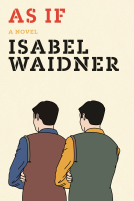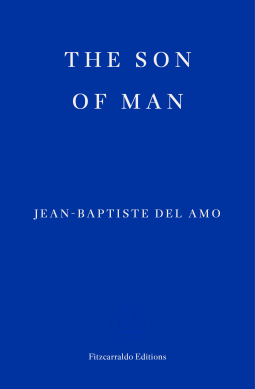
The Son of Man
by Jean-Baptiste Del Amo
This title was previously available on NetGalley and is now archived.
Send NetGalley books directly to your Kindle or Kindle app
1
To read on a Kindle or Kindle app, please add kindle@netgalley.com as an approved email address to receive files in your Amazon account. Click here for step-by-step instructions.
2
Also find your Kindle email address within your Amazon account, and enter it here.
Pub Date May 15 2024 | Archive Date May 08 2024
Talking about this book? Use #TheSonofMan #NetGalley. More hashtag tips!
Description
After several years of absence, a man reappears in the life of his wife and their young son and takes them to the dilapidated house in the mountains where he grew up with his ruthless father. There, the son discovers a nature unknown to him, wild and bewitching. As the father’s hold over mother and child grows and he dictates the mysterious laws of their new existence, the return to their previous life and home seems increasingly impossible. Haunted by his past and consumed with jealousy, the man slowly sinks into madness and his son has no choice but to challenge his father in an attempt to save something of their humanity. Brilliantly translated by Frank Wynne, The Son of Man is an exceptional novel on the transmission of violence from one generation to the next, and the second of Jean-Baptiste Del Amo’s novels to appear in English following Animalia, ‘an extraordinary book’ (Sunday Times).
Advance Praise
‘In The Son of Man the simple plot becomes as complex as the psychology of these human beasts. The writing is never precious, always precise. As the tension mounts, the sentences become longer and meandering, elusive like erupting violence. Rarely has a 39-year-old author hit the right notes so perfectly in the way he stretches his fiction.’
— Le Monde
‘The theme of transmission between father and son is at the heart of the novel. It is marked by a macabre determinism, everything is already played for, poisoned. A wandering insane grandfather casts a shadow and bad luck ricochets on his descendants. Jean-Baptiste Del Amo does not shy away from showing the atrocious. He has several strings to his hunter’s bow; an art of careful framing, of scenic observation. A taste for the primeval drive mixed with intuitions and perceptions.… There are many magnificent scenes, such as the son swimming in the river with his mother. Brief moments of light amidst the darkness and a fear so intense you could cut it with a knife.'
— Le Figaro Littéraire
Available Editions
| EDITION | Paperback |
| ISBN | 9781804270912 |
| PRICE | £12.99 (GBP) |
| PAGES | 224 |
Available on NetGalley
Average rating from 19 members
Featured Reviews
 Paul F, Reviewer
Paul F, Reviewer
“What he really wanted was to live dangerously, says the mother, there was nothing he liked better than to tempt fate. It was his idea of freedom, his idea of independence; in the end, maybe he wanted to wage war on life itself – the town had only been a backdrop and collateral damage for his revenge – to make up for the time he felt he had lost up in the mountains, under the strict, suffocating authority of his progenitor.”
The Son of Man is from the dream-team behind the Republic of Consciousness Prize winning Animalia - publisher Fitzcarraldo Editions, translator Frank @terribleman Wynne and French author Jean-Baptiste Del Amo. Fitzcarraldo's success means they've outgrown the 'small' criteria for the Republic of Consciousness Prize, which they won twice, but this surely has to be a strong contender for the 2025 International Booker Prize.
The novel is largely narrated from the perspective of a young boy who lives with his mother, who had him when she was 17, in a cramped property in a small provincial town. His father disappeared when he was very young - his memories of him more dependent on comments from his mother and two photographs she has kept - and they've had no contact with him, until he suddenly reappears one day.
The father is fiercely determined to force them to become a family again, and drives the boy and his mother up in to the mountains, where they then undertake an arduous hike to a crude, ruined, inaccessible and isolated building Les Roches where he himself lived as a boy with his own father, which he attempts, rather hopelessly, to turn into a family home.
“He seems to have decided to do battle with this plot of land whose obstructiveness is an affront, to remove anything and everything that would thwart his plan, or to give free rein, with every swing of the pickaxe, to a blind fury for reasons the child cannot fathom.”
The novel starts with an italicized prequel of a pre-historic coming-of-age in a tribe of hunters, which sets the tone for what follows. The main narration alternates between the story of the three of them, alone, in Les Roches, almost set up as a survivalist shelter with months of preserved food supplies, and that of the man's return to the town, and to his wife and son, where we learn of his own back story, allowing us to understand the blind fury.
The man's own father, who was also originally from the town, had suffered two tragedies when the man was himself a young boy. Firstly the loss of his wife, the man's mother, after a two-year painful illness, and then an industrial accident that left him with one ruined arm. Driven by anger at his fate, he bought the dilapidated property at Les Roches and move their with the man, his young son, to live a hermit-like existence with almost no contact with the outside world. As the man became of age he fled back to the town below, never seeing his father again, but as he acknowledges the legacy of his father's bitterness remains within him:
“Something of the old man had seeped into me, his pain, his madness had insidiously, surreptitiously infected me. That’s where the people in the town were partly but not completely wrong in believing that the old man had fashioned me into the right arm of his vengeance, because when I resolved to turn my back on him, long after I discovered the mutilated birch trees, when I decided to leave Les Roches, never to come back while he was still alive, I had no thought of avenging him, but already, without knowing it, I was carrying inside me the deep-rooted seed of his hatred and his bitterness.”
The man himself, aged 15 on his first return to the town where he was born, threw himself into the social life of the town, becoming the leader of a gang of teenagers, with another youth Tony as his lieutenant, who progress from joy-riding to trafficking stolen cars over the mountains into Spain (and we realise the father's disappearance was connected to this, likely a prison sentence):
“It was as though the father had come down from the mountain with the sole intention of waging war on the town, and had found in Tony – or thought he had found –an alter ego, a mirror image, or at least a partner in crime for the drinking binges, the village dances that beat like a secret heart in the night, for settling scores in the smudged light of streetlamps or drunken dawns, for reckless drives behind the wheel of a Peugeot 405 GTI, a Polo G40 (sometimes a stolen Audi Quattro or a Toyota MR2) along steeply winding roads and mountain passes, headlights casting a harsh glare, by turns on the sheer rockface and the vertiginous blocks of darkness.”
To add to the father's bitterness and the dramatic tension of the novel, the boy's mother is, on his father's return, already pregnant, with Tony's child. And as her due date draws nearer, the father refuses her entreaties that she really needs medical assistance, turning what starts as something of a slow-paced rural idyll into a tense horror story as the latent violence erupts to the surface:
“As she draws nearer, they see her defeated face, her anguished eyes looking from father to son, from son to father, while around them all is still, but for a slow, languorous vibration that might be called epidermal, since it seems to disturb only the surface of the grass, the trees, the observable reality, while the heart of the forest and the stony depths of the mountain remain frozen in hieratic indifference, and the sight of the mother painfully struggling up the steep meadow towards them, moving through this landscape transfigured by the sun, reminds the son of the reproduction of the painting by Andrew Wyeth pasted to a sheet of cardboard, hanging in a clipframe on the bedroom wall of the cramped house in the town.”
This a reference to Christina's World, a painting the boy's mother saw in a magazine in a doctor's waiting room, which she surreptitiously pocketed and framed.
As with Animalia, Wynne's rendition of Del Amo's prose is vivid, visceral and poetic at the same time, with luscious prose:
“Spring arrives, sharp as a blade.
One morning, they find the mountain ablaze with shimmering light. The air smells of claggy soil, of clover and grass thick with sap. Rocks glitter beneath a white-hot sun set into a sky of deep blue that it liquefies.
From everywhere comes the song of birds, the chirrup of insects, the cry of unseen animals that lurk in what little shadow remains, in the hollows of roots, under the leaves of evergreens, at the entrance to labyrinthine burrows – patiently dug or bitterly won – hidden by a bent twig.
Sent coursing through the branches of the trees, the sap causes myriad buds to open, their tiny perules silently falling away to reveal the blue-green leaves that unfurl and constellate the boughs with vibrant green.
The forest, hostile and barren only the day before, adorns itself with vaporous whorls, dappled shadows that make it seem less fearsome. Over the grasslands, flowers in their myriad variation open their petals; foraging insects feverishly buzz from bloom to bloom, drunk on nectar. The wind rustles through the branches of the pines, raising clouds of yellow pollen that fill the sky and are dispersed by the breeze.
In the dark chambers of the rotting trunks, pupae prepare their metamorphosis; all around, an army of tiny creatures mobilizes – teeming, crawling, industrious swarms – and begin the mysterious enterprise that occupies them night and day.
As he becomes more familiar with his surroundings, the son ventures further and further. He no longer fears the marauding bear. He no longer feels the piercing eye of the forest trained on him. The mountain appears to have accepted his presence, and now contemplates him with an equable attentiveness.”
And there are a couple of nice nods to Animalia. The 'genetrix' term makes a welcome reappearance - this the boy's grandmother, who didn't approve of her daughter's marriage to the leader of the local gang:
“The crabbed flesh of her genetrix was always forced into severe skirts that never came above her knee, blouses buttoned at the throat and the wrists, her legs sheathed in opaque tights of sempiternal beige, such that she looks like a bourgeois lady from the provinces whose family fortune was squandered and whose only inheritance was an austere, outmoded or anachronistic wardrobe best suited to a governess or a stern post-war schoolmistress.”
And, in Animalia, there is a deliberately jarring scene where Éléonore sees an aeroplane in the sky, reminding us this is the 20th not the 19th century. Here a similar scene in the remote Les Roches reminds them that there is a society they've left behind:
“His muddy hands still clutch the handle of the pickaxe resting on his chest. Swathes of mist dissolve against the sky, revealing soaring heights of chalcedony blue across which the streamlined shape of a plane is slowly moving. Though no sound reaches their ears, the very sight of the plane is an unprecedented irruption of a parallel reality, the remanence of the world they left when they came to Les Roches and which no longer seemed to exist. They follow the path of the shimmering, surreal, tubular form of the fuselage as it appears and disappears, cleaving the cumulus clouds before disappearing behind the mountain ridge, leaving only a trail of condensation in its wake that quickly fades into azure.”
Stunning.
A pretty bleak tale, I fear, but such good writing.
A son and a mother live happily together until, after years of absence, the father comes back, intending not only to stay, but to build up a new life in an isolated, half-finished house in the mountains.
The first half of the book gave me such negative feelings that I considered giving up. The father is just horrible. But curiosity won and I raced through the second half when it almost becomes a thriller, with the alternating chapters between backstory and the present day horror of the mountains.
I hadn't heard of this author but I suspect a lot of readers will appreciate the evocative writing.
*A work of strange and intoxicating immediacy, exploring wealth, the art world, and the intimacy and distance between social classes, Tell is a probing and complex examination of the ways in which we make stories of our own lives and of other people’s.*
I´m afraid I knew nothing about Buckley prior to seeing his name in the latest Fitzcarraldo catalog, but this description got me interested.
The novel´s about an art collector/businessman gone missing. Told by his gardener. In a series of interviews.
„I can talk for as long as you like, no problem. You’ll just have to tell me when to stop. How far back do you want to take it?“
It turns out that pretty soon into the story one starts regarding the main characters, the main narrative as a background one (almost?), and begins wondering about the gardener – the way she´s talking one could hardly doubt she´s telling the truth, but how could she know all these things? And, going deeper and deeper into Doyle´s (the businessman) life she reveals herself as a skillful narrator who enjoys telling a story and plays with its shape – there are jokes, digressions, cliffhangers... She enjoys the control she has - so much so that she tries to control the making of the film as well (that´s what the interviews are for). "It could be a good scene.", she suggests. Or: "If you´re going to have flashbacks, Lily has to be the main one.“
One of the central preoccupations of the novel is memory, remembering. It´s auto-thematized by the narrator herself, making her even more interesting. Much of what she knows comes from the house staff or other people Doyle was in contact with, which means that, in some cases, the story we get has already been filtered thrice. So, just how unreliable is she?
A mystery behind the mystery. Juicy!
